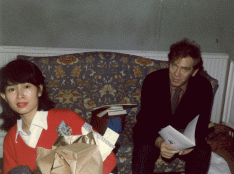We know Aung San Suu Kyi as "a golden bird in a cage"; she is a valuable icon representing freedom and democracy of which the suppressed population of Burma project much hope for. In the West she stands out as a symbol of peace and reconciliation. She has been awarded countless prizes for her effort, among them the Nobel Peace Prize.
But who is the person and woman behind it all? The Military Dictatorship has on several occasions offered her the opportunity to leave the country. But why does Aung San Suu Kyi voluntarily choose to stay in her captivity instead of going into exile?
Lady of No Fear offers a strong and fascinating glimpse into Aung San Suu Kyis life and portrays some of the consequences her freedom struggle has had, not only for her, but also for her closest friends and family indeed.

Directors note
I have travelled around the world in an effort to perceive what this remarkable woman contains. I have read her books and poems, seen her in action when she addresses her people or explains her political views. I have interviewed people that have had a life in close connection to her; family members, dear friends and politically kindred souls. They have all contributed to reflecting the different sides of her with their own touching but mixed feelings. They uphold a strong admiration for her, but at the same time there is also grief over the deprivation and suffering for which the struggle for Burmese freedom has meant for her. Other people are directly critical towards her iconic status and political strate-gies. The experience has brought me very, very close to Aung San Suu Kyi. People, who never have spoken out before, have confidentially initiated me in to very personal details and private letters concerning her. It has thrown me around emotionally and challenged my own absolute fascination of Aung San Suu Kyi.

I have been together with her close family whom she left when she choose to become a mother figure for a people and at the same time dedicated herself to the fight for democracy. I admire her courage when she speaks out strongly against the Military Junta or when she tells the West off. I am astonished over the perseverance in her struggle, in spite of the sacrifices that had to been given. Early in her life, Aung San Suu Kyi met grief and deprivation. Her father, a heroic Burmese freedom fighter was assassinated when she was 2 years old. Her beloved brother drowned shortly after. She then travels abroad and marries Michael Aris, an English citizen, the son of the dominating nation that her father liberated his people from. Aung San Suu Kyi defies her family, that disagrees with her decision. She lets love prevail, but at the same time she makes her husband to be, take an oath; if her people ever will need her, then he must support her.
Michael Aris keeps his promise in spite of the fact that he is left behind with two teenage sons. In 1988 Aung San Suu Kyi travels to her mother’s death-bed in Burma. At the same time an open confrontation breaks out between the rebels and the military in the capital. She steps forward in front of the people and never returns to England and her family again

As time goes by, her husband and sons visits to see her in Burma become more and more scarce. She is taken into house arrest and eventually prison. Her life is pursued, but she refuses to give in. Michael Aris succumbs from cancer. Before he dies, he is refused to see his wife for the last time. The people in power will allow her to travel back to England, but she knows the consequences; the Junta will never allow her to return to her people. Michael Aris and Aung San Suu Kyi never get to give each other the final farewell.
Today Aung San Suu Kyi has been released after 14 years in house arrest. I have stood in front of her heavily guarded home and felt the impression of the woman hidden behind the barbed wire. She made a fatal personal decision. But the question is how personal it was; have Burma’s population and we in the West been maintaining her position as “a golden bird in a cage”, because we are in need of symbols to believe in?

Aung San Suu Kyi has in many ways had a remarkable life. She is made of the substance that creates a dramatic character. She is beautiful, intelligent and a bearer of high ideals. She has inherited a heavy legacy from her father and she may have felt a calling to follow in his footsteps. Her nationality is Burmese, but since youth 26 years of her life, she spent in the West. The Military Junta calls her a Western Puppet, but the people love her, because she speaks freely from her heart and has the ability to unite the different ethnic groups in Burma.
She is described as a caring person but also self-willed and defying any resistance. The welfare of the people stands above her own, but is this the whole truth? Was the role as a wife and mother too restrictive for her? Or did she feel a calling for something greater? I perceive Aung San Suu Kyi in many ways as a child of destiny, but she is much more than that for me, she is: Lady of No Fear



